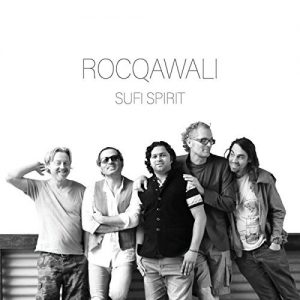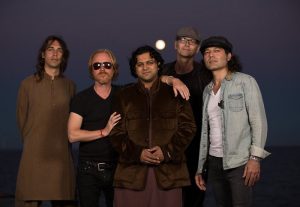 ROCQAWALI – SUFI SPIRIT (RIVERBOAT RECORDS 2017)
ROCQAWALI – SUFI SPIRIT (RIVERBOAT RECORDS 2017)
Seamlessly blending the peaceful Sufi tradition of qawali with the guttural, impassioned guitar cries of rock and roll, Rocqawali’s debut album demonstrates how the two musical styles share a deep honesty that marries sublime.
At first glance, Pakistani devotional music (qawali) and rock and roll couldn’t seem stranger bedfellows. Yet as Sufi Spirit elects, the two traditions share a deep honesty that marries sublime. The band’s drummer Stephan Grabowski attributes this to the ‘raw guts’ at the heart of both music’s. Citing early Johnny Cash’s gruesome laments and darkened ballads, Grabowski draws parallel with qawali music’s blazingly honest love songs to the divine. There is too a transcendental urge shared in both; line up thrashing rock and roll guitar and heavy drums with qawali’s impassioned vocal improvisation, driving percussion and rising handclaps and you find two genres’ indubitably united in search of ecstasy.
This album is beautifully produced by the legendary skills of Mark Howard, a previous collaborator with a roll call of rock gods (Bob Dylan, Tom Waits, Neil Young, Lucinda Williams, the list continues…). Rocqawali’s vocalist Ejaz Sher Ali hails from truly legendary stock, son of Ustad Sher Ali – one of the biggest household names in Pakistani qawali since Nusrat Fateh Ali Khan. Alongside Ejaz, Danish-Iranian Tin Soheili and Danish-Pakistani Jonas Stampe lay a solid guitar foundation, teasing and disrupting it with anarchic spirit as they go. Stephan Grabowski brings his knowledge of Western, Indian and Ethiopian grooves to the rhythm section, whilst renowned bassist Thomas Risell plugs the lower-end thick and heavy.
 This idea of eliciting a transcendent state through music seams right through the marrow of Rocqawali’s musical bones. Sufi Spirit was recorded over seven days in a Danish studio. The sessions were recorded live and centred on long, meditative jams from which the arrangements presented on this album were organically born.
This idea of eliciting a transcendent state through music seams right through the marrow of Rocqawali’s musical bones. Sufi Spirit was recorded over seven days in a Danish studio. The sessions were recorded live and centred on long, meditative jams from which the arrangements presented on this album were organically born.
Stephan explains the band’s honouring of improvisational approach in relation to qawali practice. In the Islamic Sufi tradition music is seen as a gateway to the divine, a tool by which to enter a spiritual plane closer to God. As such strict arrangements or locked melodic patterns are not performed, rather exploratory astral journeys are accessed via instinctive improvisation and skilled manipulation of form and feel. Head-banging groove ‘Alaap’ illustrates the point well, a down and dirty rendering of pure improvisation. Insistent off-beat drums and distorted prog-guitars accompany Ejaz’s sensational, undeniably ecstatic, vocal performance. Improvisation is also a tool by which to escape the self, submerged headfirst in a deep groove your thoughts become quiet and centred. Opening track ‘Ill Allah’ is based on a poem by Dr Allama Muhammad Iqbal, the spiritual father of Pakistan. The song bestows a blessing on its listeners and imparts that ‘the secret of the self is hidden’.
The endless pleasure in this album lies in letting your mind elliptically springboard between the evocative tones of Islam’s peaceful Sufi tradition and the guttural, impassioned guitar cries of rock and rolls finest heritage.
NMR (photo: RocQawali press)
















